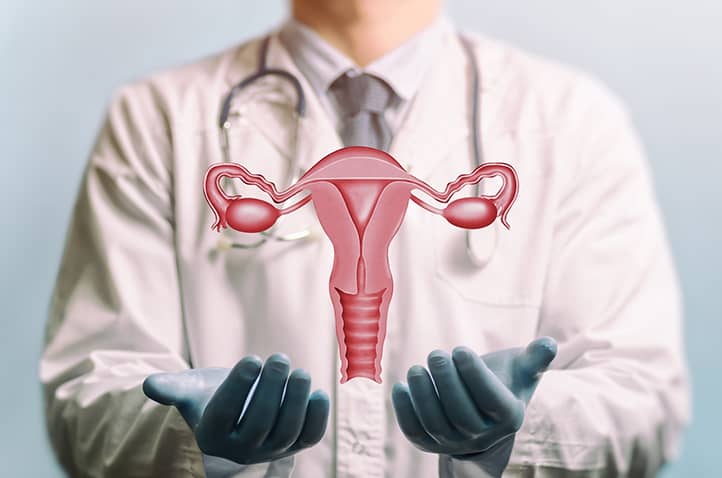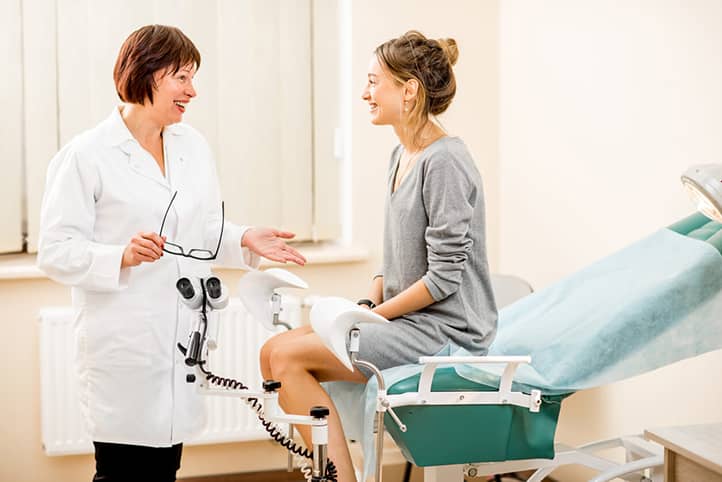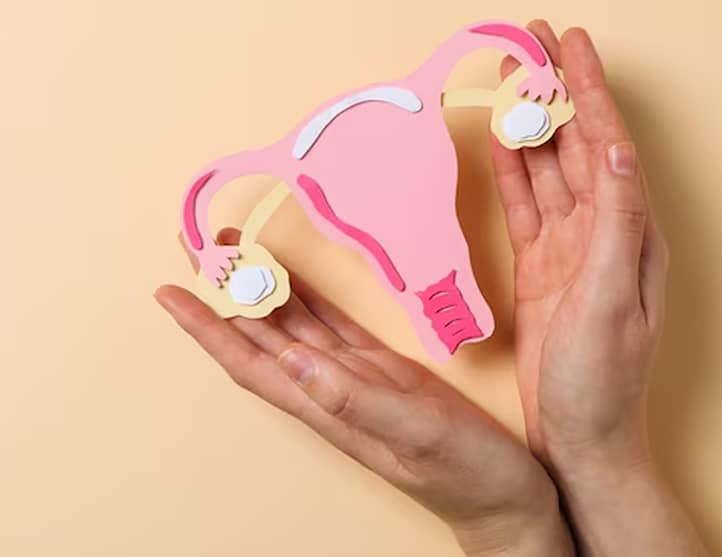Women’s Health is not only the physical condition of the body but also a complex system where physiological and psychological aspects are closely intertwined. Gynecological diseases, often perceived solely as a medical problem, actually have a profound impact on a woman’s emotional state, self-esteem, and overall quality of life.
According to data from the World Health Organization (WHO), about 40% of women of reproductive age experience various gynecological issues throughout their lives. Studies indicate that up to 50% of women with gynecological diseases suffer from accompanying psychological disorders, such as depression and anxiety.

Overview of Common Gynecological Diseases
A woman’s body is a complex and unique system that requires special attention and care. Every woman faces various changes in her body throughout her life, some of which may signal the development of gynecological diseases. Often, these remain unnoticed or are ignored due to fear, shame, or a lack of awareness.
Timely detection and treatment of gynecological issues not only improve physical health but also prevent the development of serious complications in the future. Understanding the symptoms and risks of various gynecological diseases allows women to be more attentive to their bodies and seek medical help when necessary.
Endometriosis
Endometriosis is a condition in which tissue similar to the endometrium (the inner lining of the uterus) grows outside the uterus. This condition affects about 10% of women of reproductive age, which is approximately 176 million women worldwide.
Symptoms:
- Severe pain during menstruation
- Chronic pelvic pain
- Painful intercourse
- Fertility issues
Endometriosis is often diagnosed late, leading to prolonged suffering and uncertainty for many women. According to a study published in Human Reproduction, the average time from the onset of symptoms to diagnosis is 7.5 years.
Scientific Facts
- A 2017 study published in the New England Journal of Medicine found that endometriosis is associated with an increased risk of developing certain types of ovarian cancer.
- According to the American Society for Reproductive Medicine, up to 50% of women with infertility have endometriosis.
Polycystic Ovary Syndrome (PCOS)
PCOS is a hormonal disorder that affects metabolism and the reproductive system. It occurs in 5-10% of women of reproductive age.
Characteristic Signs:
- Irregular menstruation
- Excessive hair growth
- Acne
- Weight issues
- Difficulty conceiving
PCOS can significantly affect a woman’s self-esteem and her sense of femininity.
Scientific Facts
- A 2019 study published in Fertility and Sterility found that women with PCOS have a 59% higher risk of developing depression compared to women without the condition.
- According to the U.S. Centers for Disease Control and Prevention, PCOS is one of the leading causes of female infertility, affecting the fertility of up to 80% of women with this diagnosis.
Uterine Fibroids
A fibroid is a benign tumor that grows in the uterine wall. It occurs in 20-40% of women over the age of 35.
Possible Symptoms:
- Heavy menstrual bleeding
- Pain in the lower abdomen
- Frequent urination
- Fertility issues
Although fibroids often do not pose a direct threat to life, they can significantly reduce a woman’s comfort and well-being.
Scientific Facts
- A 2018 study published in the American Journal of Obstetrics and Gynecology showed that women with symptomatic uterine fibroids have significantly lower quality of life compared to the general population.
- According to the U.S. National Institutes of Health, fibroids are the reason for about 200,000 hysterectomies (uterus removal surgeries) annually in the United States.
Vaginismus
Vaginismus is an involuntary contraction of the vaginal muscles, making sexual intercourse painful or impossible.
Main Manifestations:
- Pain or discomfort during attempted penetration
- Fear of sexual intercourse
- Difficulty using tampons or undergoing gynecological exams
This condition often has a psychological basis and can significantly impact intimate life and relationships.
Scientific Facts
- A 2020 study published in the Journal of Sexual Medicine found that cognitive-behavioral therapy combined with physical therapy can be an effective treatment for vaginismus, with a success rate of up to 90%.
- According to the International Society for the Study of Women’s Sexual Health, vaginismus occurs in 1-7% of the general female population but may be significantly higher among women seeking help for sexual problems.
Chronic Inflammatory Diseases of the Pelvic Organs
These diseases include various infectious processes affecting the reproductive organs.
Symptoms May Include:
- Chronic lower abdominal pain
- Abnormal vaginal discharge
- Fever
- Painful intercourse
Chronic inflammation can lead to long-term health and fertility issues.
Scientific Fact
- A 2019 study published in Lancet Infectious Diseases found that pelvic inflammatory diseases increase the risk of ectopic pregnancy by 6-10 times.

Emotional Consequences of Gynecological Problems
Gynecological diseases affect not only the physical aspect of women’s health but also deeply impact a woman’s emotional state. Often, the emotional component becomes the biggest challenge in the process of treatment and recovery. Women may experience a whole range of emotions—from fear and anxiety to anger and frustration.
Facing gynecological problems can alter a woman’s sense of self, impacting her perception of femininity and sexuality. This is especially relevant for conditions affecting reproductive function. Women may feel “incomplete” or “broken,” negatively affecting their self-esteem and confidence.
The emotional impact of gynecological diseases often extends beyond a woman’s personal experience, affecting her relationships with her partner, family, and friends. Difficulties communicating about her condition, fear of being misunderstood or rejected, can lead to social isolation and a decreased quality of life overall.
Anxiety and Depression
Women with gynecological problems often face an increased risk of developing anxiety disorders and depression. Constant pain, uncertainty about the future, especially regarding fertility, can evoke a deep sense of helplessness and sadness.
Manifestations:
- Persistent feelings of anxiety
- Loss of interest in previously enjoyable activities
- Sleep and appetite disturbances
- Difficulty concentrating
Scientific Data
- A 2017 meta-analysis published in Human Reproduction Update found that women with endometriosis have a 3.5 times higher risk of developing depression compared to the general population.
- Another study published in the Journal of Psychosomatic Obstetrics & Gynecology in 2018 found that up to 50% of women with PCOS exhibit symptoms of anxiety or depression.
Self-Esteem Decline
Many gynecological diseases affect a woman’s appearance and sexuality, leading to a significant drop in self-esteem.
Factors Affecting Self-Esteem:
- Changes in appearance (e.g., excessive hair growth with PCOS)
- Feeling “incomplete” due to fertility issues
- Difficulties in intimate life
Scientific Data
- A 2019 study published in the Journal of Psychosomatic Research found that women with PCOS have significantly lower levels of self-esteem and body satisfaction compared to women without the condition.
- Another study published in Fertility and Sterility in 2020 found that women with endometriosis often feel “less feminine” due to issues with fertility and sexual function.
Relationship Problems
Gynecological diseases can create tension in romantic relationships, especially if they affect sexual life or the ability to have children.
Typical Problems:
- Decreased libido due to pain or discomfort
- Difficulty communicating about one’s condition
- Tension due to inability to conceive
Scientific Data
- A 2018 study published in the Journal of Sex & Marital Therapy found that women with chronic pelvic pain have significantly lower levels of relationship satisfaction and sexual satisfaction compared to women without this condition.
- Another study published in Human Reproduction in 2019 found that couples facing infertility have a higher risk of divorce compared to the general population.
Social Isolation
Women with gynecological issues often feel isolated from others, especially if their symptoms limit social activity.
Causes of Isolation:
- Physical discomfort limiting social activity
- Feeling that others do not understand their issues
- Shame or discomfort about their condition
Scientific Data
- A 2020 study published in the Journal of Health Psychology found that women with chronic gynecological diseases often experience social isolation and have fewer social contacts compared to women without these diseases. This, in turn, is associated with a higher risk of developing depression and a decreased quality of life.
Chronic Stress
Constant struggle with symptoms, medical procedures, and uncertainty can lead to chronic stress.
Consequences of Chronic Stress:
- Worsening of overall health
- Decreased immunity
- Memory and concentration problems
- Increased risk of cardiovascular diseases
Scientific Data
- A 2018 meta-analysis published in the Journal of Psychosomatic Research found that chronic stress related to gynecological diseases can lead to changes in the functioning of the hypothalamic-pituitary-adrenal axis, which can cause various negative health outcomes, including impaired immune function and an increased risk of cardiovascular diseases.

Factors Amplifying Emotional Impact
Social expectations and stereotypes about women’s health and bodies can significantly amplify the emotional strain of gynecological diseases. Idealized images in media and social networks create unrealistic standards that women may try to meet. This can lead to a profound sense of inadequacy and shame, especially when it comes to intimate health matters.
Cultural and religious traditions also play a significant role in shaping attitudes toward gynecological issues. In some communities, discussing reproductive health is still taboo, making it difficult for women to seek support and information. This can lead to delays in diagnosis and treatment, as well as increase feelings of isolation and helplessness.
Economic factors can also heavily impact the emotional state of women with gynecological conditions. High treatment costs, potential loss of work ability, and financial dependency on a partner or family can create additional stress and anxiety. This is particularly relevant in countries where access to quality healthcare is limited or expensive.
Social Stereotypes and Taboos
In many cultures, topics related to women’s health remain taboo, creating additional barriers for women in need of support and understanding.
Challenges Related to Stereotypes:
- Shame in discussing symptoms, even with close ones.
- Guilt over one’s condition.
- Fear of stigmatization due to fertility issues.
Scientific Data
A study published in Culture, Health & Sexuality in 2019 revealed that cultural taboos surrounding menstruation and women’s reproductive health can lead to delays in seeking medical assistance and worsen the psychological state of women with gynecological issues. Another study, published in Social Science & Medicine in 2020, found that stigma around infertility can result in social isolation and depression among women facing fertility problems.
Insufficient Awareness
Low awareness of gynecological conditions among the general public often leads to misunderstanding and misjudgment.
Consequences of Insufficient Awareness:
- Delayed medical help.
- Underestimating the seriousness of symptoms.
- Spread of myths and misinformation.
Scientific Data
A study published in Patient Education and Counseling in 2018 found that low awareness of endometriosis symptoms among women and healthcare professionals leads to significant delays in diagnosis and treatment.
Diagnostic Challenges
Many gynecological diseases are difficult to diagnose, which can lead to prolonged periods of uncertainty and suffering.
Diagnostic Challenges:
- A long journey to an accurate diagnosis.
- The need for numerous, often uncomfortable, procedures.
- Frustration from a lack of clear answers.
Scientific Data
A study published in Fertility and Sterility in 2019 revealed that the average time from symptom onset to diagnosis of PCOS is two years, with many women visiting three or more doctors before receiving an accurate diagnosis. Another study, published in the Journal of Women’s Health in 2020, found that diagnostic difficulties associated with gynecological diseases are linked to an increased risk of anxiety and depression in patients.
Financial Burden
Treatment for gynecological conditions is often costly, adding additional stress for patients.
Financial Challenges:
- High costs of treatment and diagnosis.
- Loss of work ability due to illness.
- Expenses for additional services (psychotherapy, alternative treatments).
Scientific Data
A study published in the American Journal of Obstetrics and Gynecology in 2019 reported that the average annual cost of treating endometriosis in the U.S. is around $12,000 per patient, including direct medical expenses and productivity loss. Another study, published in Fertility and Sterility in 2020, found that financial stress associated with infertility treatment can negatively affect the mental health of patients and their partners.

Strategies for Overcoming Emotional Challenges
Emotional resilience plays a key role in coping with challenges associated with gynecological conditions. Developing self-regulation skills and emotional intelligence can greatly improve a woman’s ability to manage the stress and uncertainty that often accompany these conditions. Mindfulness practices, meditation, and breathing exercises can be effective tools for managing anxiety and negative thoughts.
Creativity and self-expression can also be powerful tools for overcoming emotional difficulties. Art, writing, music, or dance allow women to express their feelings and experiences in a safe way. This can not only help process complex emotions but also open up new sources of strength and inspiration.
An important aspect of emotional recovery is rethinking one’s experience and finding new meaning. Many women find strength in turning their struggle with gynecological conditions into an opportunity for personal growth and helping others. Participating in support groups or volunteering can provide a sense of purpose and community, which is key to emotional healing.
Importance of Timely Diagnosis and Treatment
Early detection and treatment of gynecological problems can significantly reduce their physical and emotional impact.
Steps for Timely Diagnosis:
- Regular gynecological check-ups.
- Attentiveness to changes in one’s body.
- Open discussion of symptoms with a doctor.
Psychological Support and Therapy
Professional psychological assistance can be invaluable for women struggling with the emotional consequences of gynecological diseases.
Types of Psychological Support:
- Individual psychotherapy.
- Cognitive-behavioral therapy to manage anxiety and depression.
- Family therapy to address relationship issues.
Scientific Data
A meta-analysis published in the Journal of Psychosomatic Research in 2020 found that cognitive-behavioral therapy can significantly reduce symptoms of depression and anxiety in women with chronic gynecological conditions. Another study, published in Fertility and Sterility in 2019, found that psychological counseling can improve quality of life and relationship satisfaction for couples facing infertility.
Support Groups and Shared Experience
Connecting with other women who face similar issues can provide emotional support and practical advice.
Benefits of Support Groups:
- Reducing feelings of isolation.
- Sharing useful information and coping strategies.
- Building a network of mutual support.
Scientific Data
A study published in Patient Education and Counseling in 2018 found that participating in support groups can significantly improve the emotional well-being and quality of life of women with endometriosis. Another study, published in Human Reproduction in 2019, found that online support groups can be especially beneficial for women facing infertility, providing access to information and emotional support 24/7.
Relaxation and Stress Management Techniques
Mastering relaxation techniques can help reduce stress and improve overall well-being.
Effective Relaxation Techniques:
- Meditation and mindfulness.
- Yoga and gentle physical exercises.
- Breathing techniques.
- Progressive muscle relaxation.
Scientific Data
A systematic review published in the Journal of Psychosomatic Obstetrics & Gynecology in 2020 found that mindfulness practice can significantly reduce symptoms of anxiety and depression in women with chronic gynecological diseases. Another study, published in Complementary Therapies in Medicine in 2019, found that regular yoga practice can reduce pain and improve quality of life in women with endometriosis.
Healthy Lifestyle
Maintaining overall health can significantly improve both physical and emotional well-being.
Components of a Healthy Lifestyle:
- Balanced nutrition.
- Regular physical activity.
- Sufficient sleep.
- Limiting alcohol and quitting smoking.
Scientific Data
A study published in Human Reproduction in 2018 found that following a Mediterranean diet can reduce the risk of developing endometriosis by 40%. Another study, published in Fertility and Sterility in 2019, found that regular physical activity can improve PCOS symptoms and increase the chances of successful conception.

The Role of Close Ones in Supporting Women
Empathy and emotional intelligence play a crucial role in the ability of close ones to effectively support women with gynecological issues. Developing these skills enables partners, family members, and friends to better understand a woman’s emotional needs and respond appropriately. This support may include active listening without judgment, acknowledging a woman’s emotions as important and valid, and being patient throughout her emotional recovery process.
Education and self-education of close ones about gynecological diseases and their impact on a woman’s emotional state are essential parts of effective support. Understanding the medical aspects of the condition, possible side effects of treatments, and the emotional challenges a woman faces allows close ones to be more prepared and compassionate. This knowledge can also help reduce the feelings of isolation and misunderstanding that women with gynecological issues often experience.
Creating a safe and supportive home environment is important for a woman’s emotional well-being. This can involve adapting daily routines to accommodate her physical and emotional needs, providing space for rest and recovery, and fostering an atmosphere of open and honest communication. It’s also essential that close ones care for their own emotional health, as this enables them to be more resilient and effective in offering support.
Understanding and Empathy
It’s essential that close ones show empathy and strive to understand a woman’s emotional state.
How to Show Empathy:
- Active listening without judgment.
- Acknowledging her emotions as important.
- Demonstrating patience and understanding.
Scientific Data
A study published in the Journal of Psychosomatic Obstetrics & Gynecology in 2019 showed that empathetic support from a partner can significantly reduce stress levels and improve the quality of life for women with chronic gynecological conditions.
Practical Assistance
Providing practical help in daily life can greatly alleviate the stress associated with the condition.
Types of Practical Assistance:
- Helping with household chores.
- Accompanying her to medical appointments.
- Assisting in finding information and resources.
Scientific Data
Research published in Social Science & Medicine in 2020 revealed that practical support from a partner and family is associated with better treatment outcomes and a higher quality of life for women with endometriosis.
Encouraging Open Dialogue
Creating an atmosphere where a woman feels free to discuss her issues is crucial for her emotional health.
How to Encourage Open Dialogue:
- Initiating conversations about her well-being.
- Expressing willingness to listen without pressure.
- Respecting her desire for privacy.
Scientific Data
A study published in the Journal of Health Psychology in 2018 found that open communication with a partner about gynecological issues is associated with lower stress levels and better relationship quality.

Modern Approaches to Treatment
The integration of artificial intelligence and machine learning technologies in the diagnosis and treatment of gynecological diseases opens new possibilities for personalized medicine. These technologies enable the analysis of large volumes of data, uncovering hidden patterns and predicting the effectiveness of various treatment methods for each patient. This can significantly improve diagnostic accuracy and treatment efficacy, while also reducing the risk of side effects.
The development of telemedicine and mobile health monitoring applications is transforming the way women interact with the healthcare system. These tools allow women to take a more active role in managing their health, providing them with access to medical consultations and information at convenient times. This is especially valuable for women living in remote areas or with limited access to specialized healthcare.
A holistic approach to treating gynecological diseases, considering not only physical symptoms but also the emotional, social, and spiritual aspects of a woman’s health, is becoming increasingly popular. This approach may involve integrating traditional medicine with alternative practices, such as acupuncture, yoga, or nutritional therapy. Such a comprehensive approach aims to enhance a woman’s overall well-being rather than merely addressing the symptoms of the disease.
Comprehensive Approach
Modern treatment increasingly includes a combination of medical, psychological, and alternative methods.
Components of a Comprehensive Approach:
- Medication.
- Surgical interventions (if necessary).
- Psychotherapy.
- Physiotherapy.
- Nutritional support.
Scientific Data
A systematic review published in the Cochrane Database of Systematic Reviews in 2020 showed that a multidisciplinary approach to treating chronic pelvic pain, which includes medical treatment, physiotherapy, and psychological support, is more effective in improving the quality of life for patients than a purely medical approach.
Innovative Treatment Methods
Science continues to advance, and new methods for treating gynecological diseases are constantly emerging.
Examples of Innovative Methods:
- Targeted hormone therapy.
- Minimally invasive surgical techniques.
- Immunotherapy.
- Regenerative medicine.
Scientific Data
A study published in the New England Journal of Medicine in 2020 found that new targeted drugs for the treatment of endometriosis can significantly reduce pain and improve quality of life with fewer side effects than traditional hormone therapy.
Personalized Medicine
The approach to treating gynecological diseases is becoming increasingly individualized, taking into account the genetic, epigenetic, and environmental factors of each patient.
Components of Personalized Medicine:
- Genetic testing.
- Biomarker analysis.
- Consideration of lifestyle and environmental factors.
- Individualized treatment plan.
Scientific Data
Research published in Nature Reviews Endocrinology in 2019 found that a personalized approach to treating PCOS, which considers genetic factors and a patient’s metabolic profile, can significantly improve treatment outcomes and reduce the risk of long-term complications.

Conclusion
Gynecological diseases continue to be a major challenge for women’s health, impacting not only physical well-being but also emotional well-being. Understanding the complexity of this impact is essential for developing effective treatment and support strategies. Modern medicine increasingly recognizes the importance of a comprehensive approach that considers both physical and emotional aspects of health.
The importance of timely diagnosis and treatment cannot be overstated. Early detection of gynecological issues not only improves the chances of successful treatment but also can significantly reduce the emotional burden associated with prolonged illness. Meanwhile, advances in technology and personalized medicine open up new possibilities for more accurate diagnosis and effective treatment.
The support of close ones and society as a whole plays a key role in overcoming the emotional challenges associated with gynecological diseases. Creating an atmosphere of understanding, empathy, and open dialogue can significantly alleviate the emotional burden for women. It’s also essential to continue efforts to overcome stigma and taboos related to women’s health to foster a more supportive and informed society.
The continuous development of medical technologies and treatment methods offers hope for improving the quality of life for women with gynecological issues. Integrating new approaches, such as telemedicine and personalized therapy, can make healthcare more accessible and effective. At the same time, it’s important to remember the holistic approach to health, which takes into account not only physical symptoms but also the emotional and social well-being of women.
Ultimately, overcoming the challenges associated with gynecological diseases requires joint efforts from healthcare professionals, patients, their close ones, and society as a whole. Through open dialogue, continuous education, and empathy, we can create an environment where every woman feels supported and has access to quality healthcare. This will not only improve women’s physical health but also contribute to their emotional well-being and overall quality of life.




